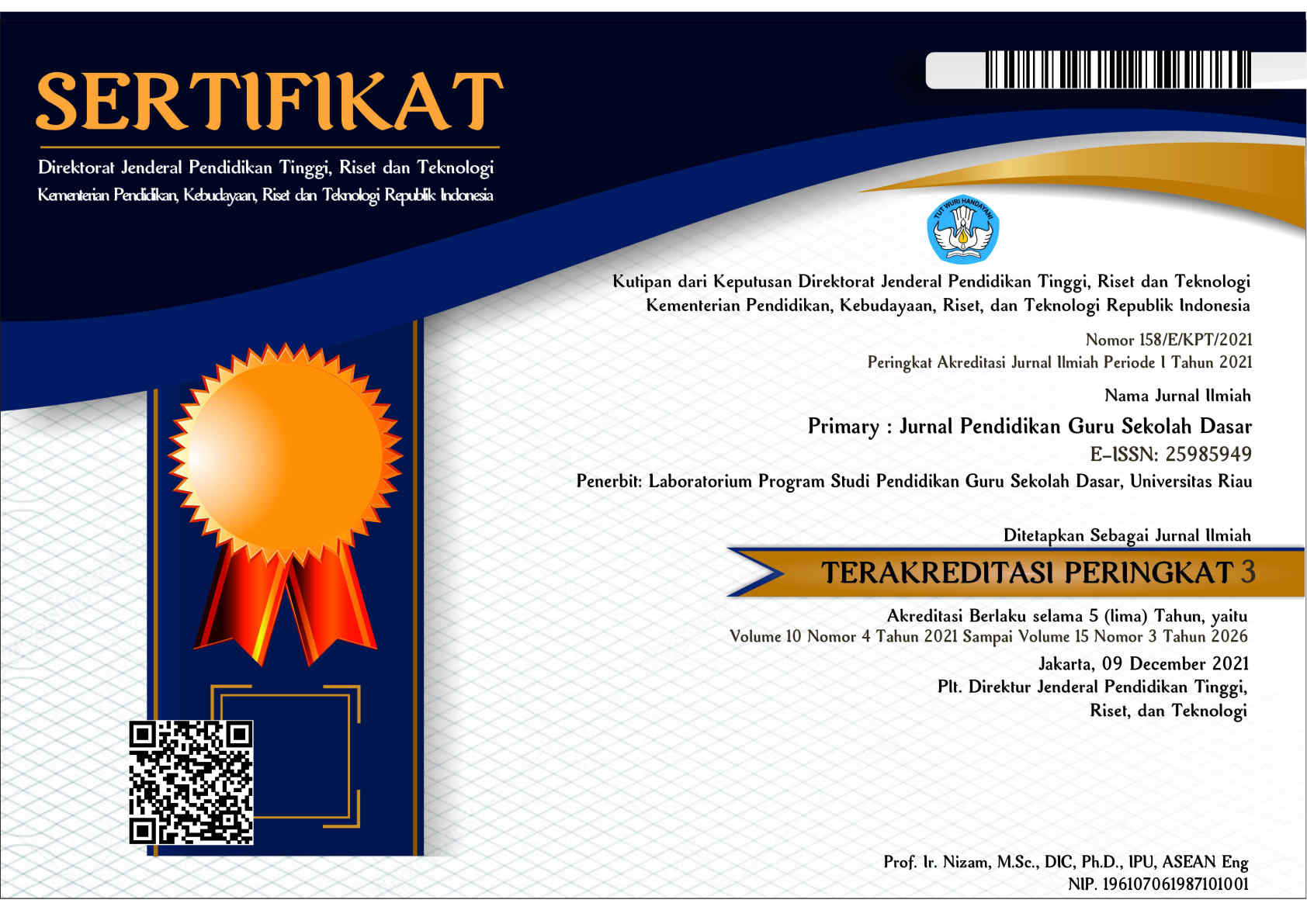MULTIPLE INTELLIGENCE-BASED ACTIVITIES: ITS EFFECTS ON ESSAY WRITING SKILLS
Abstract
Writing English essay requires complex abilities, such as critical thinking and academic writing and students often find it difficult. Beside they are using foreign language, the activities did not accommodate their personal traits and learning styles. This study was an attempt to find out the profile of students’ Multiple Intelligence (MI) and the effects of MI based activities on their essay writing skills. This experimental research was conducted in Universitas Muhammadiyah Magelang in 2020. Then 60 out of 160 fourth semester students of Elementary School Teacher Education Department were assigned as the sample. The primary data were obtained through tests supported by observation and interview. The data were assumed to be normal and homogenous. Based on the statistical analysis of Independent t-test, Sig. (2-tailed) 0.900 > 0.05. The average scores of posttest of Experimental Group also found greater than the one of control group. These concluded that MI based activities affected students’ essay writing skills. The results could be a beneficial reference in promoting students’ essay writing skills in higher education.
Keywords
Full Text:
PDFReferences
Akinwamide, T. . (2013). The Outcomes of Multiple – Draft Method on the Performance of Secondary School Students in Continuous Writing. Study in English Language Teaching, 1.
Alodwan, T. A. A., & Ibnian, S. S. K. (2014). The Effect of Using the Process Approach to Writing on Developing University Students’ Essay Writing Skills in EFL. International Journal of Linguistics and Communication, 2(2), 147–163.
Amstrong, T. (2003). Multiple Intelligences of Reading and Writing: Making the Words Come Alive. Association for Supervision and Curriculum Development.
Amstrong, T. (2009). Multiple Intelligences in the Classroom (3rd ed.). ASCD.
Behjat, F. (2012). Interpersonal and Intrapersonal Intelligences: Do they really work in foreign language learning? Procedia-Social and Behavioral Sciences, 32, 351–355.
Berman, M. (2002). A Multiple Intelligences Road to An ELT Classroom. Crown House Limited.
Brown, H. D. (2001). Teaching by principles: An Interactive Approach to Language Pedagogy. Longman.
Eng, L. L., & Mustapha, G. (2010). Enhancing Writing Ability through Multiple-Intelligence Strategies. Pertanika J. Soc. Sci. & Hum, 18, 53–63.
Gardner, H. (1993). Multiple Intelligences: The Theory in Practice. A Reader. Basic Books.
Gardner, H. (1999). Intelligence Reframe. Basic Books.
Gündüz, Z. E., & Ünal, İ. D. (2016). Effects of Multiple Intelligences Activities on Writing Skill Development in an EFL Context. Universal Journal of Educational Research, 4(7), 1687–1697. https://doi.org/10.13189/ujer.2016.040722
Naseri, E., & Ansari, D. N. (2013). The relationship between multiple intelligences and Iranian high school s tudents ’ L2 writing achievement. International Journal of Psychology and Behavioral Research, 2(5), 282–290.
Oshima, A., & Hogue, A. (2007). Introduction to Academic Writing (3rd ed.). Pearson Education.
Rahmatunisa, W. (2014). Problems Faced by Indonesian EFL Learners in Writing Argumentative Essay. ENGLISH REVIEW: Journal of English Education, 3(1), 41–49.
Sadeghi, K., & Farzizadeh, B. (2012). The Relationship between Multiple Intelligences and Writing Ability of Iranian EFL Learners. English Language Teaching, 5(11). https://doi.org/10.5539/elt.v5n11p136
Saeidi, M., & Karvandi, F. (2014). The Relationship between EFL Learners’ Multiple Intelligences and Their Performance in Reasoning-Gap Writing Task. International Journal of Language Learning and Applied Linguistics World, 5(February), 189–202.
Shayeghi, R., & Hosseinioun, P. (2015). The Relationship between Iranian EFL Learners ’ Multiple Intelligences and Their Performance on Grammar Tests. International Scholarly and Scientific Research & Innovation, 9(9), 3066–3070.
Teele, S. (2000). Rainbows of Intelligence: Exploring How Students Learn. Corwin Press Inc.
Vakili, L. (2013). The Relationship between Linguistic Intelligence and L2 Learning Strategies among EFL Learners with Intermediate Level of Proficiency. Journal of Literature, Languages and Linguistics, 1, 89–93.
Zarei, A. A., & Mohseni, F. (2012). On the Relationship Between Multiple Intelligences and Grammatical and Writing Accuracy of Iranian Learners of English. US-China Foreign Language, 10(7), 1306–1317.
DOI: http://dx.doi.org/10.33578/jpfkip.v12i6.10312
Refbacks
- There are currently no refbacks.
Copyright (c) 2023 Agrissto Bintang Aji Pradana, Tri Pujiani, Meiliana Nurfitriani

This work is licensed under a Creative Commons Attribution-NonCommercial-ShareAlike 4.0 International License.
____________________________________________________________
Primary: Jurnal Pendidikan Guru Sekolah Dasar
Secretariat
Program Studi Pendidikan Guru Sekolah Dasar
Gedung B1, FKIP Universitas Riau
Kampus Bina Widya Km. 12,5 Simpang Baru Panam
Pekanbaru Riau Indonesia 28293
e-mail : primary@ejournal.unri.ac.id



